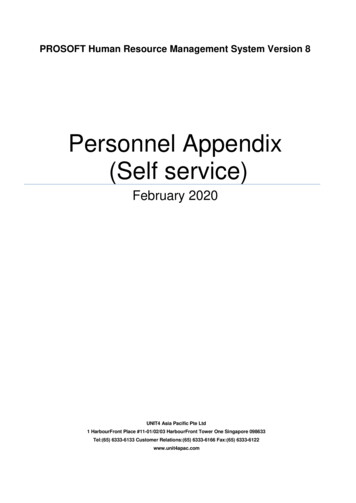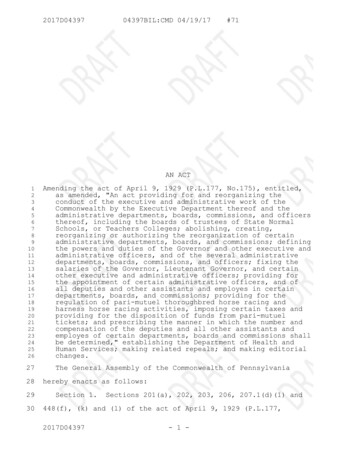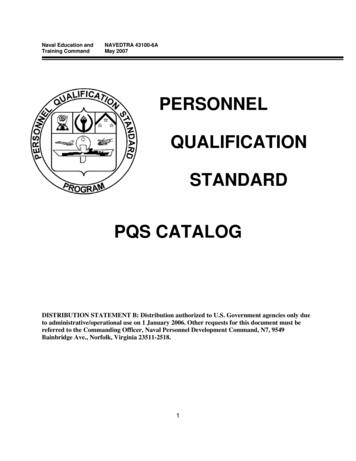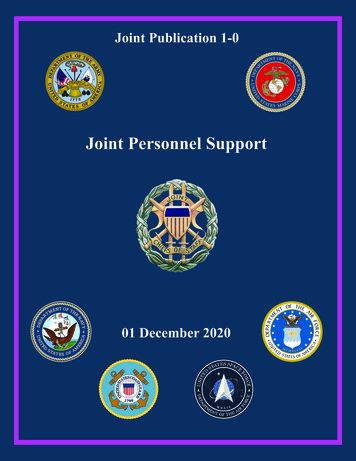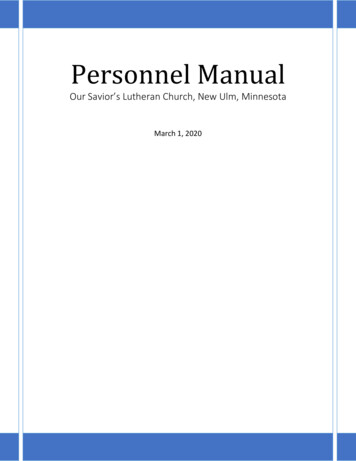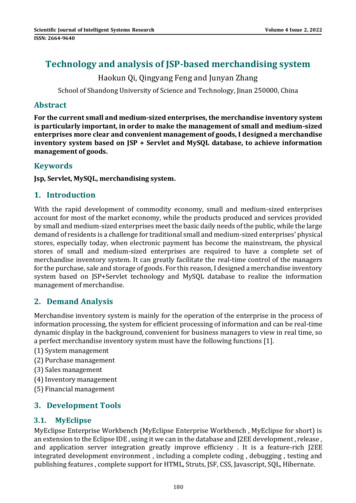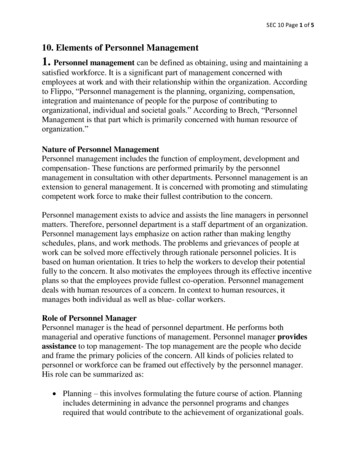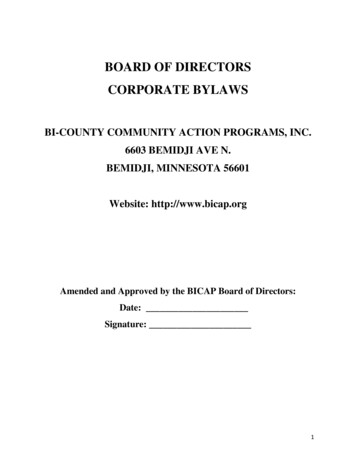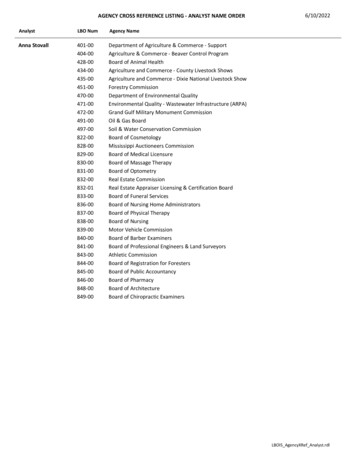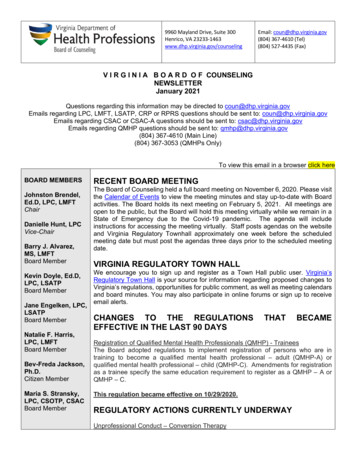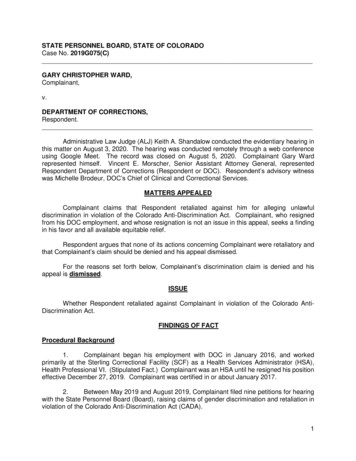
Transcription
STATE PERSONNEL BOARD, STATE OF COLORADOCase No. 2019G075(C)GARY CHRISTOPHER WARD,Complainant,v.DEPARTMENT OF CORRECTIONS,Respondent.Administrative Law Judge (ALJ) Keith A. Shandalow conducted the evidentiary hearing inthis matter on August 3, 2020. The hearing was conducted remotely through a web conferenceusing Google Meet. The record was closed on August 5, 2020. Complainant Gary Wardrepresented himself. Vincent E. Morscher, Senior Assistant Attorney General, representedRespondent Department of Corrections (Respondent or DOC). Respondent’s advisory witnesswas Michelle Brodeur, DOC’s Chief of Clinical and Correctional Services.MATTERS APPEALEDComplainant claims that Respondent retaliated against him for alleging unlawfuldiscrimination in violation of the Colorado Anti-Discrimination Act. Complainant, who resignedfrom his DOC employment, and whose resignation is not an issue in this appeal, seeks a findingin his favor and all available equitable relief.Respondent argues that none of its actions concerning Complainant were retaliatory andthat Complainant’s claim should be denied and his appeal dismissed.For the reasons set forth below, Complainant’s discrimination claim is denied and hisappeal is dismissed.ISSUEWhether Respondent retaliated against Complainant in violation of the Colorado AntiDiscrimination Act.FINDINGS OF FACTProcedural Background1.Complainant began his employment with DOC in January 2016, and workedprimarily at the Sterling Correctional Facility (SCF) as a Health Services Administrator (HSA),Health Professional VI. (Stipulated Fact.) Complainant was an HSA until he resigned his positioneffective December 27, 2019. Complainant was certified in or about January 2017.2.Between May 2019 and August 2019, Complainant filed nine petitions for hearingwith the State Personnel Board (Board), raising claims of gender discrimination and retaliation inviolation of the Colorado Anti-Discrimination Act (CADA).1
3.Complainant’s petitions were evaluated pursuant to the preliminary reviewprocess. In her Preliminary Recommendation, ALJ McCabe recommended that a hearing begranted solely on Complainant’s claims of retaliation in violation of CADA addressed inComplainant’s first and second petitions for hearing. The Board adopted the recommendation.4.After he filed his petitions for hearing with the Board, Complainant resigned hisposition with DOC. He subsequently filed an appeal with the Board, alleging that his resignationwas forced or coerced. However, the Board dismissed the appeal of his resignation as untimely.5.After the Board adopted the Preliminary Recommendation, this matter wasscheduled for hearing.Factual Background6.As an HSA, Complainant’s duties included operational and supervisory oversightof a multi-disciplinary clinical services staff of approximately ten employees, including medical,dental, mental health and rehabilitation services for offenders at SCF.7.At all times relevant to this matter, Michelle Brodeur was DOC’s Director of Clinicaland Correctional Services. She oversaw the correctional and clinical services for offenders atevery DOC facility. Ms. Brodeur supervised Dr. Jill Lampela, DOC’s Chief of Clinical Operations.8.Dr. Lampela was responsible for all clinical operations at every DOC facility. Dr.Lampela supervised regional HSAs. Regional HSAs are responsible for directly supervisingHSAs at the individual facilities.9.From approximately October 2018 through Complainant’s resignation inDecember 2019, Dr. Lampela was Complainant’s supervisor.10.When Complainant was hired as the HSA for SCF, he was tasked by thenRegional HSA Brian Hoffman with improving the Mental Health/Drug and Alcohol (MH/DA) staff,which was in disarray. Complainant’s supervision of the MH/DA staff at SCF, and his attempt tohold these staff members accountable, created friction between Complainant and the MH/DAstaff.11.The MH/DA staff at SCF were generally resistant to supervision by HSAs and hadwaged a successful campaign against the previous HSA, resulting in that HSA’s departure fromSCF.12.On the other hand, the SCF medical staff expressed a positive view of Complainantand his management style.13.Shortly after Complainant’s arrival at SCF, MH/DA staff members began to file aseries of grievances against him, objecting primarily to his style of communication, which wasgenerally direct and straightforward.14.Complainant received a Performance Improvement Plan (PIP) in September 2016addressing Complainant’s communication and interpersonal skills, and another PIP in February2018 addressing his communication and performance management.2
15.At some point prior to November 2018, Nicole Wilson, one of the MH/DA staff,submitted a grievance alleging that Complainant had inappropriately touched her. Ms. Wilsonalso alleged that Complainant had inappropriately touched two of his administrative assistants,J.T. and J.R.1 This grievance was investigated and then-Regional HSA Matt Bussa concluded, “Ihave determined that Mr. Ward has not touched female staff and is respecting their personalspace . . . .”November 6, 2018 Incident at Sterling Correctional Facility16.On the night of November 6, 2018, there was a riot at SCF during which fourcorrectional officers were assaulted by offenders. Complainant, who was home in Denver at thetime of the riot, was contacted by Ryder May, SCF’s Associate HSA, who informed him of thesituation. Mr. May indicated to Complainant that he (Mr. May) had the situation under control,which to Complainant meant that there was no need for him to report to SCF to assist. However,Mr. May was very stressed while dealing with the situation at SCF that night.17.After speaking with Mr. May, Complainant called his supervisor, Dr. Jill Lampela,and told her what little he knew about the situation at SCF. He then told her that he was goingout for a run and would be unreachable for the next half hour.18.Dr. Lampela was frustrated with Complainant’s lack of knowledge about all thatwas occurring at SCF, and was further frustrated that Complainant did not attend promptly to thecrisis at SCF.19.Dr. Lampela thought that it was Complainant’s duty to report to SCF during thiscrisis, but she failed to direct Complainant to report to SCF. Dr. Lampela was very disappointedthat Complainant did not go to SCF that night.20.Complainant was placed on administrative leave with pay on November 9, 2018,based on his failure to go to SCF during the riot. Every other department head at SCF went tothe facility on the night of November 6, 2018.Complainant’s November 2018 Step II Grievance21.On November 14, 2018, Complainant submitted a Step II grievance, choosing toskip Step I. In his grievance, Complainant alleged that Dr. Lampela did not provide direction orsupervision to him during the November 6, 2018 incident despite the fact that she thought that heneeded to report to the facility. As relief, Complainant requested that when he returned fromadministrative leave, he be assigned a different supervisor.22.On November 19, 2018, DOC’s Office of Inspector General (OIG) referredComplainant’s Step II grievance to DOC’s Office of Human Resources (OHR).23.In a letter dated November 27, 2018, Jennifer Murphy, DOC’s Employee RelationsSupervisor, informed Complainant that his Step II grievance was being referred back to hisappointing authority, Ms. Brodeur.1To protect the privacy of these individuals, whose identities are not material to this matter, they are referredto by their initials.3
24.On December 6, 2018, Ms. Brodeur held a Step II grievance meeting withComplainant.25.Ms. Brodeur issued her Step II grievance decision on December 14, 2018.Addressing Complainant’s accusation that Dr. Lampela intentionally failed to direct Complainantto report to SCF during the November 6, 2018 incident, Ms. Brodeur concluded that, “During thereview of the grievance, there was not any indication that your supervisor consciously withheldsupervisory direction from you.” Ms. Brodeur concluded, “After a review of the documents youprovided, discussions during the grievance meeting, review of policy and conversation with otherparties I am denying the relief you requested.”Complainant’s November 14, 2018 Unlawful Discrimination Complaint26.On the same day that he submitted his Step II grievance, November 14, 2018,Complainant submitted an unlawful discrimination complaint, alleging a pattern of genderdiscrimination and harassment with regard to his interactions with Dr. Lampela. In his complaint,Complainant contended that as the only male left in the entire clinical management team, hesuffered microaggressions at every monthly HSA meeting, during which Dr. Lampela wouldpurportedly hug female HSAs and say things like “I love you,” but would not do the same withComplainant. Complainant also addressed the November 6, 2018 incident, and asserted that hereported to Dr. Lampela and spoke with her four times that night but she “did not provide anydirection/supervision to me in any way.” Complainant added that, “I believe this omission ofsupervision was done on purpose, so she could later make serious allegations concerning my jobperformance.”27.On November 15, 2018, Ms. Brodeur sent a letter to Complainant regarding hisNovember 14, 2018 discrimination complaint. Ms. Brodeur informed Complainant that sheforwarded his complaint to the OHR and to the OIG for review pursuant to DOC’s AdministrativeRegulation (AR) 1450-05, which addresses complaints of harassment and discrimination, andthat “[u]pon determination of the appropriate course of action, you will receive written notice fromthe OIG.”2018-2019 Mid-Year Review28.Complainant was given his mid-year review on November 26, 2018, drafted by Dr.Lampela. He was given an overall rating of Level II (Successful). However, Dr. Lampela ratedhim at Level I (Needs Improvement) for the core competency of Communication.29.To prepare Complainant’s mid-year review, Dr. Lampela solicited comments aboutComplainant’s job performance from former Regional HSA Matt Bussa, and Matt Hansen, whowas then SCF’s Warden. In drafting and finalizing the mid-year review, Dr. Lampela deletedseveral complimentary comments provided by Mr. Bussa and Warden Hansen while leaving in allnegative comments and occasionally attributing some of her own negative comments to others.Complainant’s November 29, 2018 Unlawful Discrimination and Retaliation Complaint30.On November 29, 2018, Complainant submitted an unlawful discriminationcomplaint against Dr. Lampela and Ms. Brodeur, alleging that, since he submitted his November14, 2018 discrimination complaint, “there are two separate conditions that I feel are retaliatory innature.”Those two conditions included the failure to change his supervisor despiteAR 1450-05, IV(C)(5)(e), which provides that “[u]pon receipt of an unlawful discrimination and/or4
discriminatory harassment complaint, the appointing authority will take steps to provide immediaterelief to the complainant until resolution can be achieved through appropriate inquiry orinvestigation.” In addition, Complainant alleged that his mid-year review constituted “[c]learretaliation for me filing a discrimination complaint against Ms. Lampela.” Complainant pointed outthat “[t]hree of out [sic] six competencies contained rather serious performance ‘allegations’.However, I was completely unaware of these reported deficiencies.”31.On December 4, 2018, Grace Novotny, OIG’s Chief Investigator, sent a letter toComplainant, acknowledging receipt of Complainant’s November 29, 2018 unlawfuldiscrimination complaint pursuant to AR 1450-05, and informing Complainant that the OIG wouldnot investigate the complaint.December 7, 2018 Board Rule 6-10 Meeting and Subsequent Investigation32.On December 7, 2018, Warden Hansen held a Board Rule 6-102 meeting withComplainant arising from his handling of the November 6, 2018 incident. Afterwards, WardenHansen investigated SCF employees’ perceptions of Complainant as a supervisor.33.As part of Warden Hansen’s investigation of Complainant’s supervisoryperformance, on January 18, 2019, Warden Hansen spoke with Breton Willson, an SCF MH/DAstaff member, who disclosed an alleged incident that occurred in March 2017 involvingComplainant. Mr. Willson told Warden Hansen that, in March of 2017, while presenting somepaperwork, Complainant grasped Mr. Willson’s hand and held it for a prolonged time. Mr. Willsonclaimed that this physical contact made him uncomfortable and he felt that Complainant wasmaking a sexual advance. Mr. Willson characterized Complainant as a sexual predator. Mr.Willson said previous to the alleged hand-holding incident, Complainant had touched his kneewhile seated in conversation and put his hand on Mr. Willson’s shoulder, back and arm whiletalking.34.Although Warden Hansen did not believe that Complainant had harassed or madea sexual advance towards Mr. Willson, he gave Mr. Willson a copy of AR 1450-05.35.After Mr. Willson reviewed AR 1450-05, he felt that he was obligated to submit acomplaint against Complainant, which he did.36.Mr. Willson’s complaint was referred to the OIG, which conducted an investigationand issued an Investigative Report. The OIG investigator concluded that Mr. Willson’s complaintwas not credible.Continuation of Rule 6-10 Meeting and Complainant’s April 2019 Discrimination Complaint37.On March 28, 2019, Warden Hansen conducted a continuation of the Rule 6-10meeting with Complainant. During this Rule 6-10 meeting, Complainant was provided the twoinvestigative reports, one of which, in Complainant’s view, “contained very disturbing testimonyby Mr. Bretton [sic] Wilson [sic].”Board Rule 6-10 provides, in pertinent part, “When considering discipline, the appointing authority mustmeet with the certified employee to present information about the reason for potential discipline, disclosethe source of that information unless prohibited by law, and give the employee an opportunity to respond.The purpose of the meeting is to exchange information before making a final decision.”25
38.On April 8, 2019, Complainant submitted a discrimination complaint against Mr.Willson, alleging that Mr. Willson created a hostile work environment, and accusing Mr. Willsonof conduct unbecoming (insubordination, professionalism, workplace conduct, formalinvestigations/legal contacts). Referring to what Mr. Willson told the OIG investigator,Complainant wrote that it revealed that “Mr. Wilson [sic] wanted to see me removed as SCF’sHSA and to that end he made false, serious, slanderous and defamatory allegations againstmyself with the explicit goal of getting me fired from the CDOC. Additionally, I feel that thisrepresents a hostile work environment.”39.On April 10, 2019, Ms. Novotny sent an email to Complainant regarding his April8, 2019 complaint:As we discussed previously in our phone conversation, the informationcontained in your formal complaint and previous email to Mr. Hansen, hasalready been investigated and has been presented to the assigned AppointingAuthority, Mr. Matthew Hansen. As we discussed, the OIG will not beconducting any additional investigation into your claims since the informationis already contained in a formal investigative report. This matter is beingreferred back to Mr. Hansen for review and disposition.40.On April 22, 2019, Complainant emailed Ms. Brodeur and Rick Thompkins, DOC’sHuman Resources Director, seeking clarification about the status of his November 14, 2018gender discrimination complaint. Complainant expressed concern about Respondent’s failure torespond to his November 14, 2018 gender discrimination complaint. Complainant alleged thatRespondent had violated provisions of AR 1450-05 by not meeting with him and not issuing adecision within 45 days of the OIG referral.41.On April 26, 2019, Warden Hansen issued a disciplinary action and a correctiveaction to Complainant. The disciplinary action was subsequently rescinded.42.On April 29, 2019, Complainant was provided with his performance evaluation forthe fiscal year April 1, 2018 through March 31, 2019.43.On May 3, 2019, Complainant filed an appeal of his disciplinary and correctiveactions with the Board.Responses to Complainant’s Discrimination and Retaliation Complaints44.On May 23, 2019, Mr. Hansen, who was by then the Deputy Director of PrisonOperations, issued a response to Complainant’s two discrimination complaints – the November14, 2018 gender discrimination complaint against Dr. Lampela and the November 29, 2018retaliation complaint against Dr. Lampela and Ms. Brodeur. Mr. Hansen concluded:I have received both of your complaints, along with Professional StandardsInvestigation #2019-000241 in which your allegations were investigated alongwith other possible performance concerns, along with all other relevantinformation available. I have determined that there is no evidence to supportyour allegations of gender/sex discrimination or retaliation at this time.45.On May 29, 2019, Ms. Brodeur issued a response to Complainant’s April 8, 2019discrimination complaint against Mr. Willson. Ms. Brodeur wrote, in pertinent part, “I have6
investigated your complaint, conducted discussions with those you named, along with otherrelevant information provided to me. I have determined that there is no evidence to support theseclaims.”Complainant’s Board Petitions and Subsequent Events46.On or about May 30, 2019, Complainant filed a petition for hearing with the Board,alleging that Ms. Brodeur’s response to Complainant’s April 8, 2019 discrimination complaintviolated provisions of AR 1450-05: the requirement that a response be issued within 45 days ofthe OIG referral and that the appointing authority meet with Complainant prior to issuing adecision. Complainant raised claims of gender discrimination and retaliation.47.On June 3, 2019, Complainant filed another petition for hearing with the Board,this time alleging that Mr. Hansen’s May 23, 2019 response to his November 14, 2018 genderdiscrimination complaint and his November 29, 2018 gender discrimination and retaliationcomplaint violated AR 1450-05. Complainant alleged that Warden Hansen did not issue hisdecision within 45 days of the OIG referral and failed to meet with him prior to issuing the responseto the complaint. Complainant claimed that Respondent’s actions were retaliatory.48.On August 2, 2019, Complainant was given an amended corrective action, withoutan accompanying disciplinary action, which provided, in part, as follows:[A]llegations presented by several staff assigned to the SCF TherapeuticCommunity Programs (T.C.) during a prior grievance review that indicatedpossible violations by you of Administrative Regulation 100-18, MissionStatement, 1450-01, Code of Conduct, and your performance plan. Theseviolations are related to your communications and interactions with yoursubordinate staff. Additionally, information was provided regarding concernsthat you had not provided adequate oversight and leadership to your stafffollowing a significant incident within Sterling Correctional Facility (SCF) onNovember 6, 2018.49.On December 11, 2019, Complainant resigned from employment with CDOC.(Stipulated Fact)50.Complainant appealed his resignation, claiming it was forced or coerced, but hisappeal was dismissed as untimely and was not addressed in this matter.DISCUSSIONComplainant alleges that Respondent retaliated against him in violation of CADA. Section24-50-125.3, C.R.S., empowers the Board to review appeals for allegedly discriminatory actions.More specifically, Complainant alleges that Respondent retaliated against him foropposing perceived gender discrimination, in violation of CADA. Complainant’s first petition forhearing, filed with the Board on June 3, 2019, alleged that Ms. Brodeur failed to timely respondto the discrimination complaint Complainant submitted on April 8, 2019, and failed to meet withhim, all in violation of AR 1450-05. Complainant alleges it was retaliatory for his having previouslyfiled an unlawful discrimination claim against Ms. Brodeur.7
Complainant’s second petition for hearing, received by the Board on June 6, 2019, allegedthat Mr. Hansen retaliated against Complainant for his November 14, 2018 unlawful genderdiscrimination complaint against Dr. Lampela and his November 29, 2018 complaint against Dr.Lampela and Ms. Brodeur, alleging discrimination and unlawful retaliation. Complainant allegedthat Mr. Hansen’s response to his unlawful discrimination and retaliation charges violatedadministrative regulations by being untimely and by Mr. Hansen not meeting with him to discusshis claims.Under CADA, it is a “discriminatory or unfair employment practice [f]or any person,whether or not an employer [t]o discriminate against any person because such person hasopposed any practice made a discriminatory or an unfair employment practice by [CADA],because he has filed a charge with the [Colorado Civil Rights] commission, or because he hastestified, assisted, or participated in any manner in an investigation, proceeding, or hearingconducted pursuant to parts 3 and 4 of this article.” § 24-34-402(1)(e)(IV), C.R.S. The antiretaliation provision of CADA parallels that of its federal counterpart in Title VII of the Civil RightsAct of 1964. Federal Title VII law serves as a guide to CADA. Colo. Civil Rts. Comm’n v. Big OTires, Inc., 940 P.2d 397, 399 (Colo. 1997). Board Rule 9-4 provides, “Standards and guidelinesadopted by the Colorado Civil Rights Commission and/or the federal government, as well asColorado and federal case law, should be referenced in determining if discrimination hasoccurred.”To establish a prima facie case of retaliation in violation of CADA, Complainant mustestablish the following three prongs: (1) he engaged in protected opposition to discrimination;(2) he suffered a materially adverse action, i.e., an action sufficient to dissuade a reasonableworker from engaging in protected opposition to discrimination; and (3) a causal connection existedbetween the protected activity and the materially adverse action. Burlington N. & Santa Fe Ry.Co. v. White, 548 U.S. 53, 68 (2006); Pinkerton v. Colo. Dep’t of Transp., 563 F.3d 1052, 1064(10th Cir. 2009).If the employee establishes a prima facie case of retaliation in violation of CADA, theburden shifts to the employer to articulate a legitimate, non-retaliatory reason for its actions.McDonnell Douglas v. Green, 411 U.S. 792, 806 (1973); Big O Tires, 940 P.2d at 400-01. If theemployer states a legitimate, non-retaliatory reason for its actions, “the complainant must then begiven a full and fair opportunity to demonstrate by competent evidence that the presumptivelyvalid reasons for the employment decision were in fact a pretext for discrimination.” Id. at 401.A.Complainant engaged in protected opposition to purported discrimination.The first prong of a prima facie case of retaliation requires Complainant to show that heengaged in protected opposition to an employment practice that is unlawful under CADA.“Protected opposition can range from filing formal charges to voicing informal complaints tosuperiors.” Hertz v. Luzenac Am., Inc., 370 F.3d 1014, 1015 (10th Cir. 2004).On November 14, 2018, Complainant submitted a gender discrimination complaint. Thenon November 29, 2018, Complainant submitted an unlawful discrimination complaint against Dr.Lampela and Ms. Brodeur, alleging retaliation for submitting his November 14, 2018discrimination complaint. These complaints constitute protected opposition to an employmentpractice that is unlawful under CADA. Accordingly, Complainant has established the first prongof a prima facie case of retaliation.8
B.A reasonable employee would have found the actions taken by Respondentafter Complainant’s November 2018 complaints materially adverse.The second prong of a prima facie case of retaliation requires Complainant to establishthat he was subjected to actions that a reasonable employee would have found to be adverse,i.e., an action sufficient to dissuade a reasonable worker from making a complaint. See BurlingtonN. & Santa Fe Ry. Co., 548 U.S. at 68. See also McGowan v. City of Eufala, 472 F.3d 736, 742(10th Cir. 2006). Actions such as corrective actions, threats of corrective actions, letters ofreprimand, negative performance evaluations, and job reassignments can be considered adverseactions in the context of a claim of retaliation in violation of CADA. See Dunn v. Shinseki, 71 F.Supp. 3d 1188, 1191-92 (D. Colo. 2014) (negative performance reviews may qualify as adverseemployment actions in retaliation cases); Stover v. Martinez, 382 F.3d 1064, 1071 (10th Cir. 2004)(a series of allegedly adverse actions can be analyzed in the aggregate to determine whether,taken together, they amount to an adverse employment action).Complainant alleges that Respondent violated several of its own policies in responding tohis gender discrimination claims, including failing to remove Dr. Lampela as his supervisor, failingto meet with him, and failing to issue a written decision within the established timeframes. Inaddition, Complainant claims that the relevant policy, AR 1450-05, required Respondent toremove Dr. Lampela as Complainant’s supervisor, which was not done. In addition, the evidenceindicates that Dr. Lampela crafted Complainant’s mid-year review, given to Complainant onNovember 26, 2018, in such a way as to de-emphasize positive observations of others,accentuate negative comments, and make it appear that management personnel other than Dr.Lampela (i.e., former Regional HSA Matt Bossa and Mr. Hansen) were responsible for thenegative comments. Furthermore, Complainant was called into a Board Rule 6-10 meeting onDecember 7, 2018, raising the possibility that he would be subjected to a disciplinary action.Although not generally or specifically identified as an adverse action in the case law,treating Complainnat’s complaints in the manner in which Respondent did – not meeting withComplainant to discuss his complaints and failing to issue decisions in a timely manner, forinstance – may be viewed as adverse actions that are likely to dissuade a reasonable personfrom engaging in protected activity. Instead of taking Complainant’s complaints seriously, andexpeditiously and definitively investigate Complainant’s allegations of discrimination, Respondentacted as if Complainant’s concerns were not worthy of prompt and genuine consideration.Respondent’s treatment of Complainant’s complaints would likely dissuade a reasonable personfrom bringing a complaint. Moreover, a somewhat negative mid-year review, and beingsummoned to a Rule 6-10 meeting, which raised the possibility of discipline, are properly viewedas adverse actions under these circumstances.Accordingly, Complainant has established the second prong of a prima facie case ofunlawful retaliation in violation of CADA.C.Complainant has established a causal connection between thepurported protected activity and the materially adverse actions.The third prong of a prima facie case of retaliation requires Complainant to demonstratea causal connection between his protected activity and the adverse actions.Complainants usually establish a causal connection by showing the close temporalproximity between a protected activity and an adverse action. See, e.g., Metzler v. Federal HomeLoan Bank of Topeka, 464 F.3d 1164, 1171 (10th Cir. 2006) (“We have repeatedly recognized9
temporal proximity between protected conduct and termination as relevant evidence of a causalconnection sufficient to justify an inference of retaliatory motive”). Generally speaking, a timeperiod between the protected activity and the adverse action of three months or more cannotsupport an inference of a causal connection. See Richmond v. ONEOK, Inc., 120 F.3d 205, 209(10th Cir. 1997) (a period of three months between the protected activity and the adverse action,standing alone, is not sufficient to establish causation); Piercy v. Maketa, 480 F.3d 1192, 1198(10th Cir. 2007) (acknowledging that an adverse employment action occurring three months afterthe protected activity cannot, standing alone, demonstrate causation).In the two weeks after his unlawful discrimination complaint submitted on November 14,2018, Respondent allegedly violated AR 1450-05, and Dr. Lampela provided Complainant a midyear review that is best characterized as slanted against Complainant. After Complainant’sNovember 29, 2018 unlawful discrimination complaint, Complainant was called into a Rule 6-10meeting on December 7, 2018, with the threat of disciplinary action. Mr. Hanson then conductedan investigation into perceptions of Complainant’s management style and allegations ofComplainant touching employees inappropriately, leading to a disciplinary action and correctiveaction on April 26, 2019.3 There is a temporal proximity between Complainant’s discriminationcomplaints and adverse employment actions taken against him.Accordingly, the temporal proximity between the Complainant’s protected activities inNovember 2018 and the adverse actions referenced above establish a causal connectionsufficient to meet the requirements of the third prong of a prima facie case of unlawful retaliationin violation of CADA.D.Complainant Failed to Establish That Respondent’s PurportedLegitimate, Non-Retaliatory Reasons for Its Actions Were a Pretextfor Retaliation.At hearing, Respondent provided legitimate, non-retaliatory reasons for the adverseactions taken against Complainant. The preponderance of the evidence established that Dr.Lampela was not removed as Complainant’s supervisor because Ms. Brodeur reasonablyconcluded that there was no basis to believe that Dr. Lampela’s failure to order Complainant togo to SCF on the night of the November 6, 2018 incident had anything to do with genderdiscrimination. The preponderance of the evidence also established that Dr. Lampela’squestionable handling of Complainant’s mid-year r
For the reasons set forth below, Complainant's discrimination claim is denied and his appeal is dismissed. ISSUE Whether Respondent retaliated against Complainant in violation of the Colorado Anti-Discrimination Act. FINDINGS OF FACT Procedural Background 1. Complainant began his employment with DOC in January 2016, and worked


